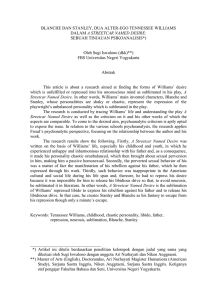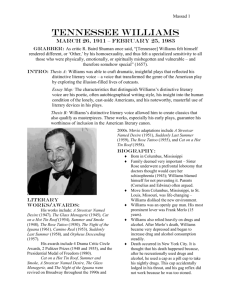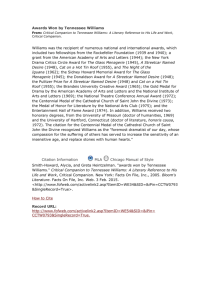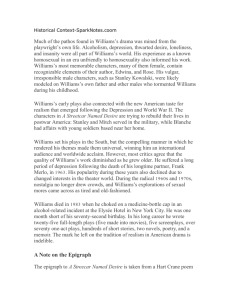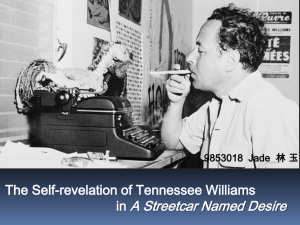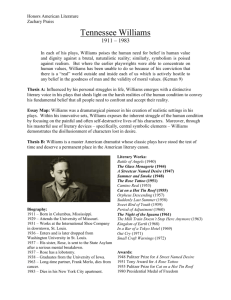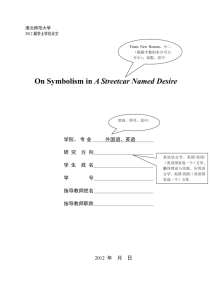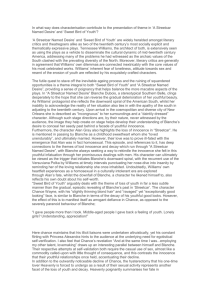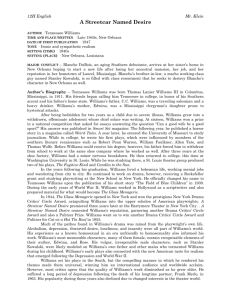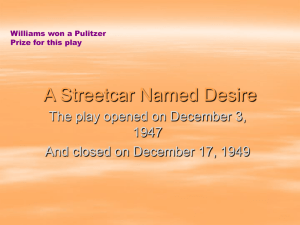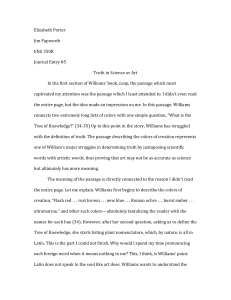Views and Values
advertisement
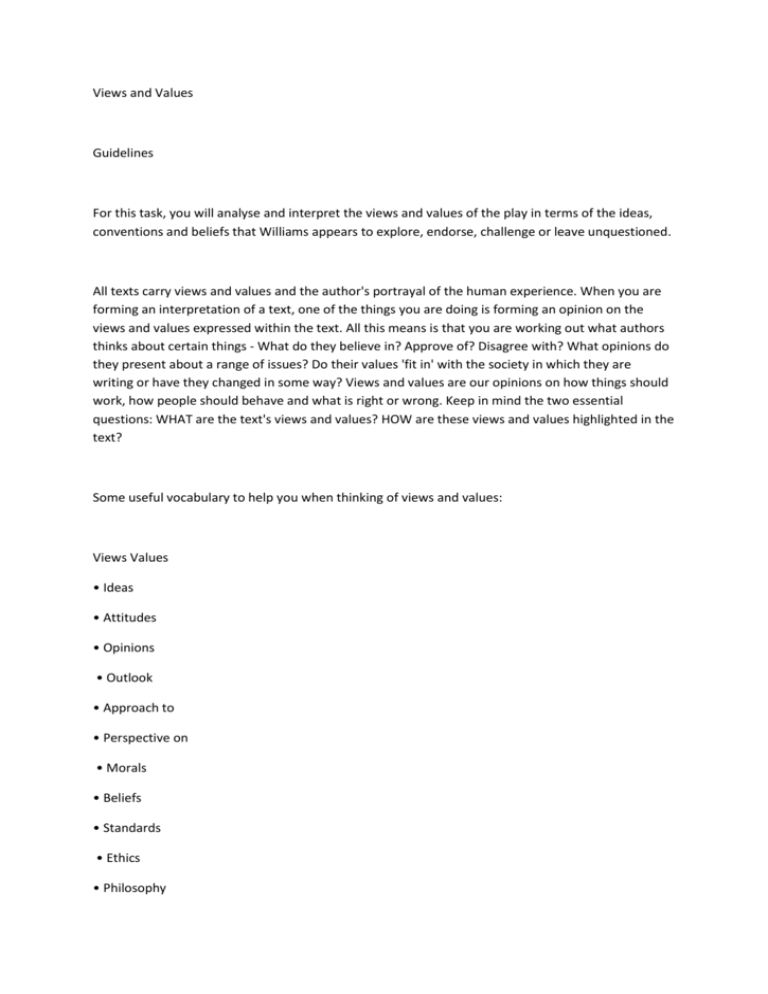
Views and Values Guidelines For this task, you will analyse and interpret the views and values of the play in terms of the ideas, conventions and beliefs that Williams appears to explore, endorse, challenge or leave unquestioned. All texts carry views and values and the author's portrayal of the human experience. When you are forming an interpretation of a text, one of the things you are doing is forming an opinion on the views and values expressed within the text. All this means is that you are working out what authors thinks about certain things - What do they believe in? Approve of? Disagree with? What opinions do they present about a range of issues? Do their values 'fit in' with the society in which they are writing or have they changed in some way? Views and values are our opinions on how things should work, how people should behave and what is right or wrong. Keep in mind the two essential questions: WHAT are the text's views and values? HOW are these views and values highlighted in the text? Some useful vocabulary to help you when thinking of views and values: Views Values • Ideas • Attitudes • Opinions • Outlook • Approach to • Perspective on • Morals • Beliefs • Standards • Ethics • Philosophy • Principles Essentially you are interpreting the play and commenting on what you perceive to be the Williams's views and values. For example, does Williams condemn or condone the 'new world'? What is his attitude towards women? As with all texts, you need to analyse themes, motifs, characterization, relationships, setting, narrative style and structure, point of view, imagery, symbolism, and the ideas about society and the individual that are being communicated. Many students identify views and values quite well, but do not take the next step and show whether the text or author endorses, challenges or leaves unquestioned those views and values. Below are explained the main terms for the positions a text can take with regard to the ideas and attitudes circulating within it. The following word bank provides many alternative words to use in your analytical writing. Critique A text provides a critique of a viewpoint, value or belief by examining it critically. Various aspects are considered, positive as well as negative. The overall position is negative, or critical. A critique can be wide‑ranging in scope, e.g. a critique of white settlement in Australia, a critique of materialism in modern societies, etc. Endorse When a text takes a positive stance in relation to a view or value, it can be said to endorse that view or value The qualities endorsed by the text will often be embodied in one or more characters who are represented sympathetically. The qualities endorsed will usually be contrasted with views or values that have opposing effects: — the value of loyalty could be endorsed by showing the destructive consequences of betrayal — the value of generosity would become evident through a representation of characters who are greedy and selfish, and so on. The views and values endorsed by a text are not necessarily also endorsed by the society depicted in the text, or by the society in which the text is published – hence the controversial reception of many literary texts. Challenge A text challenges views and values when it reveals their shortcomings and limitations: in other words, their negative impacts on people. The text could challenge the attitudes and beliefs of certain. aberrant characters, or of society as a whole. Views and values can be challenged through the development of the narrative, so that harmful effects only become increasingly evident as the plot unfolds and conflict becomes more intense. Even when a text challenges views and values, it is likely to include a degree of complexity in its treatment of these ideas. It may, for example, show why a character takes up criminal activity by depicting their troubled childhood – thereby demonstrating compassion and understanding, but not actually legitimating such behaviour. Leave unquestioned No text can explicitly acknowledge and explore every point of view on all aspects of society and human behaviour. There will always be gaps, silences and omissions – if the text was as messy and all‑inclusive as life itself, it would lack the coherence that makes it literature. And the writer’s own experience and interests usually mean there are views and values they have no wish to represent. Views and values can be left unquestioned when a character who might present a challenging point of view is marginalised or silent in the text. Leaving views and values unquestioned might be a reflection of the writer’s bias – that is, not prejudice as such, but simply the characteristic attitudes and conventions of their own cultural, historical and social contexts. Identifying views and values that are left unquestioned can illuminate aspects of the text’s construction; its clear and compelling narrative might be made possible by its omission of complicating details and alternative perspectives. In writing your essay it is essential that you emphasise Williams's role, especially HOW (i.e. by what means) he makes certain views and values (including his own) clear to the reader. Below is a list of topic questions you can expect for a Views and Values essay. To fully prepare for this task, you are required to complete the Views and Values Table. Download this table here. Sample Views and Values Essay Topics 1 "The central conflict in A Streetcar Named Desire is between the energies of the primitive and the decadence of high cultivations." Discuss. 2 "In A Streetcar Named Desire, Williams dramatises the conflict between two ways of life as a clash in sexual terms - the old world associated with febrile femininity, the new with a charismatic but brutal masculinity." Discuss. 3 "In A Streetcar Named Desire Williams is concerned with the nature and effects of human sexuality." Discuss. 4 "A Streetcar Named Desire offers Williams a means of dramatising through vividly characterised and recognisable individuals his sense of the South's past being still active and often destructive in modern America." Discuss. 5 "In A Streetcar Named Desire, Williams shows that brutal reality will always destroy sensitivity and hope." Discuss. 6 "Through male attitudes toward women, Williams is concerned to demonstrate issues of power and powerlessness." Discuss. 7 "In A Streetcar Named Desire, Williams condemns those who accept life as it is, who accommodate themselves to an imperfect existence; his sympathy lies with Blanche who clings to what life ought to be." Discuss. 8 "A Streetcar Named Desire, may be summed up as what Williams views to be the basic rhythm of physical existence: desire and death." Discuss. 9 "Throughout A Streetcar Named Desire, Williams is concerned with the process of remembering and the conflict between the past and the present." Discuss. 10 "Although Williams exposes Blanche for her self-deception and dishonesty, he is nevertheless sympathetic to her need for illusion and escape." Discuss. 11 "Blanche is far from perfect by the play's end she is Williams's undisputed moral victor; Blanche is more worthy than the rest of them." Discuss. back to top
